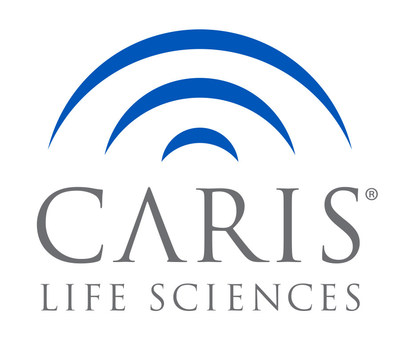Caris Life Sciences Showcases Data on KRAS Mutations in Patients With Non-Small Cell Lung and Pancreatic Cancer at ASCO20 Virtual Scientific Program
|
IRVING, Texas, May 29, 2020 /PRNewswire/ --Caris Life Sciences®, a leading innovator in molecular science focused on fulfilling the promise of precision medicine, will present results from a study today that characterize KRAS mutations in patients with non-small cell lung cancer (NSCLC). In this study, the molecular profiles of more than 17,000 patients with NSCLC were evaluated using the Caris Molecular Intelligence® platform, which were then classified based on specific types of KRAS mutations using a 592-gene DNA sequencing panel. The study found that KRAS mutations are relatively common in NSCLC and that differences between KRAS mutation subtypes warrant further investigation in how they could guide treatment decisions, including the use of targeted and immuno-oncology drugs. Across 17,113 NSCLC patients, KRAS mutations were present in 27% of samples (n=4,706), with KRAS G12C being the most common variant and present in 40% of samples that exhibited a mutation. KRAS G12C was associated with the highest rate of PD-L1 expression. The rate of high tumor mutational burden (TMB) (>10 mutations/MB) was significantly different across KRAS mutation subtypes and was most frequently seen in KRAS G13X (68.3%) and least frequently in G12D (43.2%). KRAS mutations were more commonly seen in adenocarcinoma versus squamous subtype (37.2% vs. 4.4%) The full results will be presented today during a poster session (Abstract 9544/Poster 310) as part of the American Society of Clinical Oncology 2020 (ASCO20) Virtual Scientific Program. The poster is titled, "Characterization of KRAS mutations (mt) in non-small cell lung cancer (NSCLC)." In a second study, the molecular profiles of a large cohort of KRAS wild-type (WT) pancreatic tumors were evaluated using DNA sequencing and whole transcriptome sequencing (WTS), which were then classified based on specific types of KRAS mutations using a 592-gene DNA sequencing panel. The study looked to assess the prevalence of alterations that could represent targets for personalized treatment. Researchers found that the use of WTS, in combination with DNA sequencing, identified activated molecular pathways in the majority of KRAS WT tumors, and that these tumors are significantly more enriched with targetable alterations (e.g., BRAF, ALK, ROS1, NRG1, MSI-H) compared to KRAS mutant tumors. These findings suggest a potential benefit of using targeted therapies to treat patients with KRAS WT tumors. "While KRAS mutations in pancreatic cancer are found in the majority of cases, we used comprehensive molecular profiling to generate crucial information on mutations and transcriptional programs found in KRAS wild-type pancreatic cancer that provide additional opportunities for therapeutic intervention in this cancer type that has a low survival rate and few treatment options," said Philip A. Philip, M.D., Ph.D., FRCP., lead investigator of the study and an oncologist with Barbara Ann Karmanos Cancer Institute at Wayne State University, a member of the Caris Precision Oncology Alliance. The full results will be presented today during a poster session (Abstract 4629/Poster 237). The poster is titled, "Alterations in targetable molecular pathways are enriched in KRAS wild-type (WT) pancreatic cancer (PC)." "Our data at ASCO20 continue to reinforce the power of molecular profiling and precision medicine technologies in changing the face of cancer treatment," said W. Michael Korn, M.D., Chief Medical Officer at Caris Life Sciences. "The combination of Next-Generation DNA Sequencing and whole transcriptome sequencing is giving clinicians new insights and clearer direction in how they approach non-small cell lung cancer and pancreatic cancer, two particularly difficult-to-treat cancers." Additional Presentations Provide Key Insight Into The Genetic Profile of Cancer
"As we continue to learn more about the molecular landscape of cancer, it is important to study all cancers, including those that are more uncommon and those that have an established treatment paradigm," said Chadi Nabhan, M.D., MBA, FACP, Chairman of the Caris Precision Oncology Alliance. "At Caris, our goal is to work with leading institutions to bring precision medicine to all people living with a cancer diagnosis, so that each patient can receive the best possible therapy for their own distinct cancer." About the Caris Precision Oncology Alliance About Caris Life Sciences Caris is also advancing precision medicine with Caris MAI™ (Molecular Artificial Intelligence) that combines its innovative service offerings, Caris Molecular Intelligence® with its proprietary artificial intelligence analytics engine, DEAN™, to analyze the whole exome, whole transcriptome and complete cancer proteome. This information, coupled with mature clinical outcomes on thousands of patients, provides unmatched molecular solutions for patients, physicians, payers and biopharmaceutical organizations. Caris Pharmatech is changing the paradigm and streamlines the clinical trial process by assisting biopharma companies with accessing research-ready oncology sites for clinical trials. With over 200 research sites within the Caris Pharmatech JIT Oncology Network, biopharma companies can identify and enroll more patients, faster. Caris Pharmatech Just-In-Time Clinical Trial Solutions focus on rapid site activation and patient enrollment to streamline the drug development process. By implementing a Just-In-Time (JIT) Research System, site activation and patient enrollment is achievable within 14 days for pre-registered locations with pre-qualified patients. Headquartered in Irving, Texas, Caris Life Sciences offers services throughout the U.S., Europe, Asia and other international markets. To learn more, please visit www.CarisLifeSciences.com or follow us on Twitter (@CarisLS). Caris Life Sciences Media & Company Contact:
SOURCE Caris Life Sciences |

